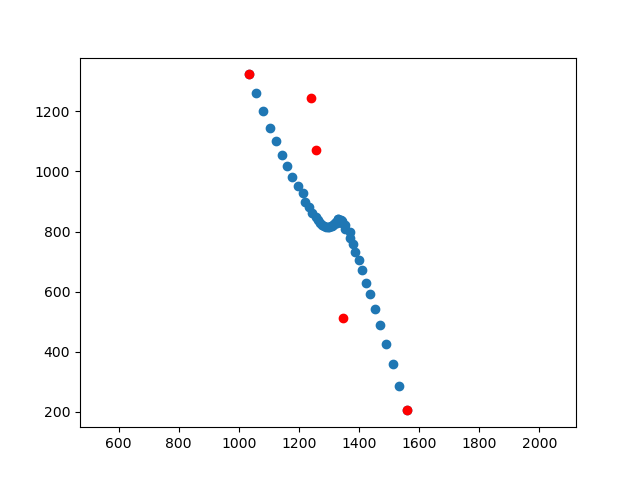A python library for generating beizer curves.
pip install beizer-curvesdef beizer_curve(
points,
output_points_count: int,
destructive: bool = False,
dtype: np.dtype = np.int64,
):Generate a beizer curve.
points- Knots in format:[[x1, x2, ..., xn], [y1, y2, ..., yn], [z1, z2, ..., zn]].output_points_count- How many points of the curve to generate.destructive- Allow function to modifypointsarray. Don't set to true, if you want to usepointsarray later.dtype- dtype of array of returned points of the curve.
Points of a curve are returned in format: [[x1, x2, ..., xn], [y1, y2, ..., yn], [z1, z2, ..., zn]], where n is output_points_count.
def random_beizer_curve(
start_point,
end_point,
output_points_count: int,
random_points_count: int = 1,
point_spread: float = 1,
noise_max_offset: float = 0,
noise_rate: float = 0.5,
dtype=np.int64,
return_forming_points: bool = False,
):Generate a random beizer curve, which starts at start_point and ends at end_point.
-
start_point,end_point- coordinates of start and end points of curve in format[x, y, z, ...]. -
output_points_count- How many points of the curve to generate.if output_points_count < 0: output_points_count = math.ceil(distance / -output_points_count)
Where
distanceis distance between start and end. -
random_points_count- How many knots to generate. -
point_spread- A scale of a rectangular figure with corners of start_point and end_point, in bounds of which random knots are generated. Has to be > 0. -
noise_max_offset- Max offset of a curve point.if output_points_count < 0: output_points_count = math.ceil(distance / -output_points_count)
Where
distanceis distance between start and end. -
noise_rate- A part of curve points to apply noise offset to. Has to belong to [0; 1]. -
dtype- dtype array of returned points of the curve. -
return_forming_points-return points, curve if return_forming_points else curve, wherepointsare randomly generated knots
import random
import matplotlib.pyplot as plt
import numpy as np
from beizer_curves import *
def plot_curve(points_count, i):
start = [random.randrange(1, 2000), random.randrange(1, 2000)]
noise = -200 * i
end = [random.randrange(1, 2000), random.randrange(1, 2000)]
points, curve = random_beizer_curve(
start,
end,
output_points_count=50,
random_points_count=points_count,
noise_max_offset=noise,
noise_rate=0.25,
dtype=np.float64,
return_forming_points=True,
)
fig = plt.figure()
plt.axis("equal")
plt.scatter(curve[0], curve[1])
plt.scatter(points[0], points[1], color='red')
fig.savefig(f"example_{points_count}_{i + 1}.png")




